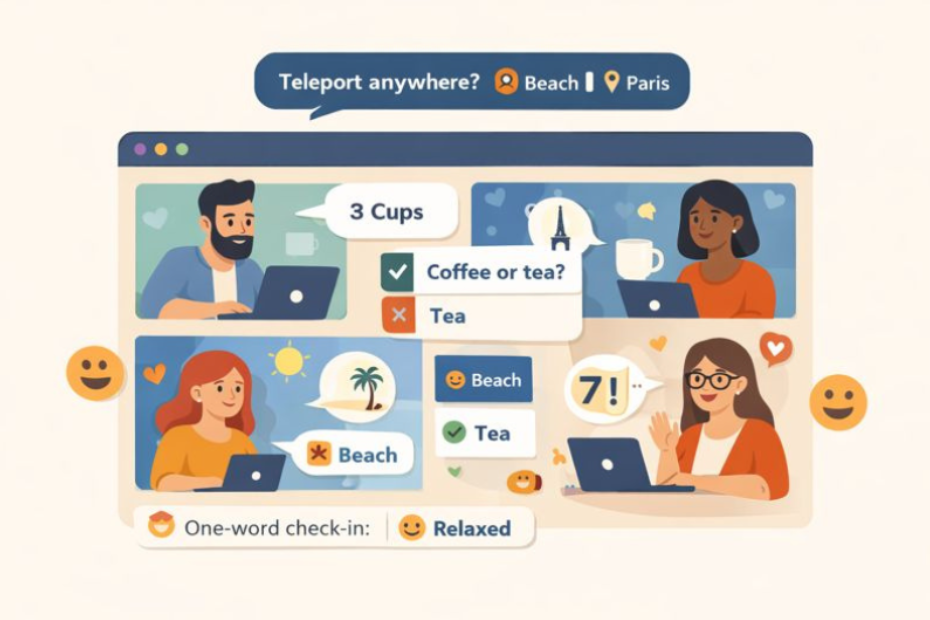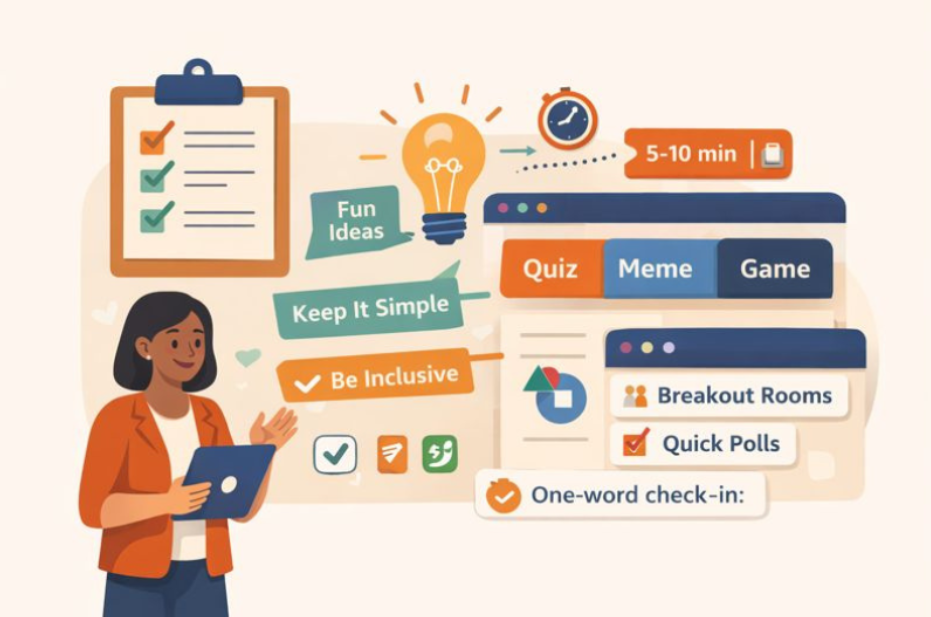Virtual Icebreakers for remote teams: Fun ideas for people who hate "Team building"
Remote team icebreaker ideas that actually work for remote teams. Discover low-pressure activities that boost engagement without awkward team building.

Remote team meetings can often feel impersonal, especially when teams rarely interact outside of work tasks. Fun icebreaker games are designed to fix that, but let’s be honest, many traditional icebreakers feel awkward, forced, or simply ineffective.
In this guide, we’ll share practical, low-pressure virtual icebreakers for remote teams, including ideas that work for introverts, large groups, and people who genuinely dislike “team building.”
Key takeaways
- A remote team icebreaker is most effective when it is short (5–10 minutes), low-pressure, and inclusive, helping remote teams connect without forced team-building activities.
- When used consistently, simple virtual icebreakers games can encourage team members to engage, communicate and create connections.
What are virtual icebreakers?
Virtual icebreakers are activities or questions designed to energize team meetings, promote engagement, and break down barriers in a remote environment. Unlike traditional games that can feel cheesy or overused, these virtual icebreaker ideas focus on inclusivity, creativity, and accessibility.
Challenges with traditional icebreakers
Icebreakers can fail for many reasons:
- Lack of Interest: Traditional activities often don't resonate with the entire team.
- Awkwardness: Introverts or task-oriented individuals can find them anxiety-inducing.
- Repetition: Overused games like Skribbl.io or Gartic Phone lose their charm quickly.
- Logistical Barriers: Activities requiring complex setups or installations can exclude participants.
- Large Groups: Keeping up engagement in virtual teams of 20+ can feel impossible.
But when done right, virtual icebreakers can:
- Boost Engagement: Kickstart meetings with energy and enthusiasm.
- Strengthen team connections: Promote camaraderie without awkwardness.
- Enhance Communication: Set a collaborative tone for discussions.
- Increase Productivity: Teams that connect work more effectively together.
Break the Monotony: Add variety and fun to the workday.
Tried and tested icebreaker ideas we use at BuddiesHR

Quick and casual questions
Perfect for large teams or time-crunched meetings:
- “How many cups of coffee do you drink daily?”
- “If you could teleport anywhere, where would it be?”
- “What’s one thing you’d do if you won the lottery?”
Low-pressure activities
These ideas promote bonding without the cringe factor:
- Show and Tell: Share an interesting item from your desk.
- Mood Drawing: Sketch your current mood and share with the group.
- Virtual Background Contest: Compete for the funniest or most creative background.
Games for team-building skeptics
Fun, simple games that encourage creativity and laughter:
- Two Truths and a Lie: Share three statements, one of which is false. The team guesses the lie.
- Counting Game: The team must count to 20 collectively without speaking over each other. If two people speak at once, start over.
- Three Words Story: Build a story by adding three words at a time.
Icebreakers for Specific WFH Scenarios
For large teams
- Breakout Rooms: Create teams of smaller groups can try virtual escape rooms or trivia.
- Structured Prompts: Assign a facilitator for each room to keep things on track.
For introverts
- One-on-One Pairing: Use simple conversation prompts like, “What’s a hobby you’ve recently picked up?”
For busy schedules
- Rapid-Fire Questions: Quick “this or that” options like coffee vs. tea.
- One-Word Check-Ins: “Describe your week in one word.”
BONUS 1: Advanced and creative icebreaker options

Personal and desk-related activities
- Desk Show and Tell: Share something quirky or meaningful from your workspace.
- Pet Parade: Introduce your pets (or your dream pet).
Scenario-based prompts
- Superpower and Kryptonite: Describe your dream superpower and its downside.
- Describe Your City: Share fun clues about where you live—without naming it.
Leverage technology
Use online tools to make activities seamless:
- Kahoot!: Create fun team quizzes.
- Geoguessr: Explore virtual destinations together.
- MakeItMeme: Participants create and share memes for laughter, making it a great fit for creative teams or design-led roles.
BONUS 2: Tips for running icebreakers that actually work
Adapt to the audience
Some teams prefer short, task-focused meetings. Adjust accordingly.
Set clear rules
Avoid chaos by establishing who goes next or assigning turns.
Experiment with formats
Try different activities to see what resonates best with your team.
Keep it low-pressure
Avoid putting participants on the spot. Use activities that allow people to contribute in their own way.
Be inclusive
Tailor activities to suit the team's size, culture, and preferences. Respect the introverts!
Make it simple
Choose browser-based games or activities that don't require downloads or installations.
Keep it short
Limit icebreakers to 5–10 minutes to avoid cutting into the meeting's main agenda.
Establish structure
For larger groups, establish an order or assign turns to maintain flow and avoid chaos.
Conclusion

Virtual events don’t have to feel forced or awkward to be effective. When they’re simple, inclusive, and respectful of different personalities, they can make remote meetings more human and help teams connect beyond tasks.
The key is to keep icebreakers low-pressure, flexible, and purposeful. Experiment with a few ideas, see what resonates with your team, and adapt over time. Even small moments of connection can make a big difference in remote work. Skip the clichés and give these activities a try at your next virtual meeting. Your team might just thank you for it!
Icebreakers are a great starting point, but sustained engagement requires consistency. Tools like Clappy (peer recognition) and Alfy (casual team connections) help remote teams build those moments into everyday Slack conversations, without forcing awkward activities.
Frequently Asked Questions
What are the best virtual icebreakers for remote teams?
The best icebreakers for remote teams are low-pressure activities that work well in virtual meetings and help team members connect naturally. Examples include quick icebreaker questions, one-word check-ins, or short activities that don’t require preparation or downloads.
How long should a virtual icebreaker last? remote team icebreaker
Most effective icebreakers last between 5 and 10 minutes during online meetings. Anything longer risks cutting into the meeting’s main purpose and reducing focus.
Are virtual icebreakers good for introverts?
Yes, when designed correctly. Virtual icebreakers that allow chat responses, optional participation, or small breakout discussions work well in a virtual setting and help encourage remote team members to participate at their own comfort level.
Do virtual icebreakers actually improve team engagement?
When used consistently and thoughtfully, these virtual icebreakers can improve communication and support healthy team bonding.
What is a good 5-minute icebreaker for remote meetings?
A good 5-minute icebreaker for a virtual or hybrid meeting could be a quick poll, a short guessing game, or a fast round of Two Truths and a Lie. These short virtual icebreaker activities work well on any video call without disrupting the main agenda.
What are some engaging virtual icebreakers for mixed teams?
An engaging virtual icebreaker for mixed teams can include simple activities like a quick team trivia quiz, visual prompts, or optional discussion questions. These formats allow both introverts and extroverts to participate without putting anyone on the spot.
Can virtual icebreakers work in hybrid or video-based meetings?
Yes. Virtual icebreakers work well in virtual and hybrid meetings when run through a familiar video conferencing tool. Simple prompts, chat-based responses, or short activities is a fun way to help align remote workers and in-office participants alike.




